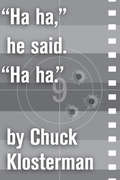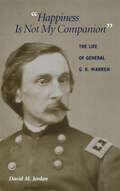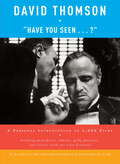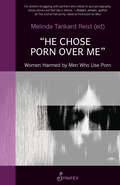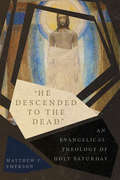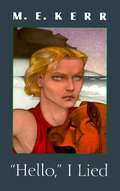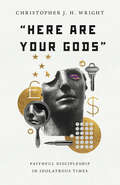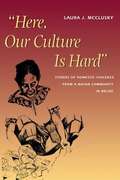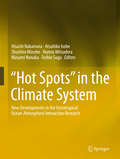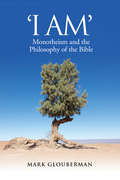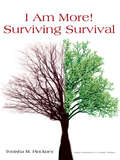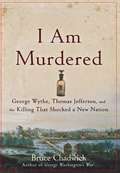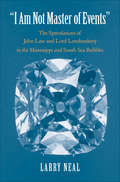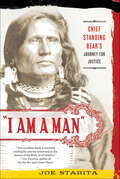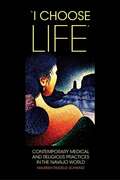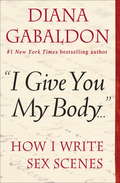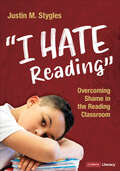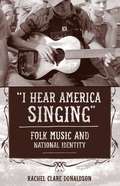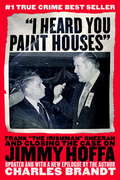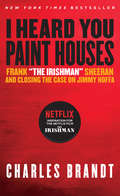- Table View
- List View
"Ha ha," He Said. "Ha ha."
by Chuck KlostermanOriginally collected in Eating the Dinosaur and now available both as a stand-alone essay and in the ebook collection Chuck Klosterman on Film and Television, this essay is about sitcoms.
"Happiness Is Not My Companion": The Life of General G. K. Warren
by David M. JordanThe valorous but troubled career of the Civil War general best known for defending Little Round Top and averting a Union defeat at Gettysburg.The lieutenant colonel of a New York regiment and rising star in the Army of the Potomac, Gouverneur K. Warren performed heroically at Gettysburg. For his service at Bristoe Station and Mine Run, he was awarded command of the Fifth Corps for the 1864 Virginia campaign.But Warren’s peculiarities of temperament and personality put a cloud over his service at the Wilderness and Spotsylvania and cost him the confidence of his superiors, Grant and Meade. He was summarily relieved of his command by Philip Sheridan after winning the Battle of Five Forks, just eight days before Appomattox. Warren continued as an engineer of distinction in the Army after the war, but he was determined to clear his name before a board of inquiry, which conducted an exhaustive investigation into the battle, Warren’s conduct, and Sheridan’s arbitrary action. However, the findings of the court vindicating Warren were not made public until shortly after his death.For this major biography of Gouverneur Warren, David M. Jordan utilizes Warren’s own voluminous collection of letters, papers, orders, and other items saved by his family, as well as the letters and writings of such contemporaries as his aide and brother-in-law Washington Roebling, Andrew Humphreys, Winfield Hancock, George Gordon Meade, and Ulysses S. Grant. Jordan presents a vivid account of the life and times of a complex military figure.
"Have You Seen ... ?" A Personal Introduction to 1,000 Films
by David ThomsonIn 1975, David Thomson published his Biographical Dictionary of Film, and few film books have enjoyed better press or such steady sales.Now, thirty-three years later, we have the companion volume, a second book of more than 1,000 pages in one voice--that of our most provocative contemporary film critic and historian.Juxtaposing the fanciful and the fabulous, the old favorites and the forgotten, this sweeping collection presents the films that Thomson offers in response to the question he gets asked most often--"What should I see?" This new book is a generous history of film and an enticing critical appraisal written with as much humor and passion as historical knowledge. Not content to choose his own top films (though they are here), Thomson has created a list that will surprise and delight you--and send you to your best movie rental service.But he also probes the question: after one hundred years of film, which ones are the best, and why?"Have You Seen . . . ?" suggests a true canon of cinema and one that's almost completely accessible now, thanks to DVDs. This book is a must for anyone who loves the silver screen: the perfect confection to dip into at any point for a taste of controversy, little-known facts, and ideas about what to see. This is a volume you'll want to return to again and again, like a dear but argumentative friend in the dark at the movies.From the Hardcover edition.
"He Chose Porn over Me": Women Harmed by Men Who Use Porn
by Melinda Tankard ReistHe chose porn over me. Porn killed my marriage. It killed my trust. It destroyed my sense of self and understanding of true intimacy-CourtneyShattering the popular myth that porn is harmless, the personal accounts of 25 brave women in He Chose Porn over Me reveal the real-life trauma experienced by women at the hands of their porn-consuming partners – men who were supposed to care for them. This confronting but necessary book dares to tell the truth about pornography's destructive impact – about the men who habitually use it and the women and children who are mistreated and discarded as a result.The women in this book were collateral damage in their partner's insatiable greed for porn. Their stories tell of the crushing of intimacy, respect, connection, love. Porn colonised their families, leaving women rejected and scarred. They were subjected to sexual terrorism in their own homes. The men, turbo-charged by pornography, were intoxicated by sexualised power. They didn't care if they lost everything including their partners. In this haunting exposé, pornography is rightfully situated as an insidious tool of violence against women.The contributors, now working to re-build their lives, found a confidante in Melinda Tankard Reist who supported them in the sharing of their experiences in these pages, and to warn other women – don't date men who use porn...As long as pornography exists, we don't stand a chance of creating a fair and equal world. —Carla
"He Descended to the Dead": An Evangelical Theology of Holy Saturday
by Matthew Y. EmersonThe Gospel Coalition"I believe he descended to the dead."
"Hello," I Lied
by M. E. KerrSummering in the Hamptons on the estate of a famous rock star, seventeen-year-old Lang tries to decide how to tell his longtime friends that he is gay, while struggling with an unexpected infatuation with a girl from France.
"Here Am I - Send Aaron"
by Jill BriscoeThis book is designed to be used either for personal Bible study or for group Bible study.
"Here Are Your Gods": Faithful Discipleship in Idolatrous Times
by Christopher J. WrightWhen the Israelites exclaimed, "Here are your gods!" at the sight of the golden calf, they were attempting to hold on to the God of their history while fashioning idols for their own purposes. In today's Western world, plenty of shiny false gods still hold power—idols of prosperity, nationalism, and self-interest. Christians desperately need to name and expose these idols. We must retrieve the biblical emphasis on idolatry and apply it anew in our journey of following Jesus. In "Here Are Your Gods," Old Testament scholar Christopher J. H. Wright combines a biblical study of idolatry with practical discipleship. He calls readers to consider connections between Old Testament patterns and today's culture, especially recurring temptations to trust in political power. Now as much as ever, we need a biblically informed understanding of the many ways humans make gods for themselves, the danger of idols, and how God calls us to join him in the battle against idolatry as part of his ongoing mission to be known and worshiped by all peoples.
"Here, Our Culture Is Hard": Stories of Domestic Violence from a Mayan Community in Belize
by Laura J. MccluskyMarriage among the Maya of Central America is a model of complementarity between a man and a woman. This union demands mutual respect and mutual service. Yet some husbands beat their wives. <P><P> In this pioneering book, Laura McClusky examines the lives of several Mopan Maya women in Belize. Using engaging ethnographic narratives and a highly accessible analysis of the lives that have unfolded before her, McClusky explores Mayan women's strategies for enduring, escaping, and avoiding abuse. Factors such as gender, age inequalities, marriage patterns, family structure, educational opportunities, and economic development all play a role in either preventing or contributing to domestic violence in the village. McClusky argues that using narrative ethnography, instead of cold statistics or dehumanized theoretical models, helps to keep the focus on people, "rehumanizing" our understanding of violence. This highly accessible book brings to the social sciences new ways of thinking about, representing, and studying abuse, marriage, death, gender roles, and violence.
"Hot Spots" in the Climate System: New Developments in the Extratropical Ocean-Atmosphere Interaction Research
by Hisashi Nakamura Atsuhiko Isobe Shoshiro Minobe Humio Mitsudera Masami Nonaka Toshio SugaThis book consists of the articles from thespecial issue of "'Hot Spots' in the Climate System" in the Journal of Oceanography,Vol. 71 No. 5, 2015, comprising 9 chapters that cover a wide spectrum oftopics. This spinoff book is a collection of papers on the scientific outcomesof a nationwide 5-year project funded by the Japanese Ministry of Education,Culture, Sports, Science and Technology (MEXT) and known internationally as the"Hot-Spot Project. " The academic achievement of the project has gainedinternational recognition, making substantial contribution to unveiling theclimatic role of warm western boundary ocean currents, including the Kuroshio,and associated oceanic fronts characterized by sharp temperature gradients andactive meso-scale oceanic eddies. Specifically, those warm currents may becalled "hot spots" in the climate system, as they intensively release heat andmoisture to the atmosphere, thereby acting to organize clouds and precipitationsystems and set conditions favorable for recurrent development of storms. Thisspinoff is a unique collection of the outcome of the particular project. Thecollected papers cover a wide range of aspects of ocean-atmosphere interactioncharacteristic of the oceanic fronts and continental marginal seas, unveiledthrough observational, theoretical, analytical, and numerical investigations. Most of the readers of the book are assumed to be researchers and graduatestudents who study climate dynamics, physical oceanography, atmosphericscience, and air-sea interaction.
"I AM": Monotheism and the Philosophy of the Bible
by Mark GloubermanFor whom was the Hebrew Bible written? How much truth does it contain? What, according to the Bible, is the place of men and women in the world? What connection is there between the Bible and morality? In "I AM" Mark Glouberman supplies new answers to these old questions. He does this by establishing that the foundational scripture of the West is, first and foremost, a philosophical document, not a theological tract, nor yet the religious history of a nation. The author identifies the Bible’s fundamental principle, the ontological principle of particularity. This principle, he shows, is what makes the Bible the revolutionary text that it is. God’s "I AM WHO I AM" asserts the principle, of which the Bible’s deity is a personified form. God’s self-identification also points to the real, anthropological, meaning of the ism called "monotheism." A portion of Glouberman’s book is devoted to illustrating the Bible’s live relevance in many of the areas where modern philosophers congregate, including moral philosophy, political philosophy, metaphysics, and epistemology. Isn’t it a bit late in the day for the Bible’s meaning to be revealed? Glouberman says that it’s about time.
"I Am More!" Surviving Survival
by Tonisha M. Pinckney"I realized if I could live through all that, then I most certainly could live on! I survived my own survival! That was my first step toward saying 'I AM MORE!'" The second installment in the I AM MORE! series, this book tells a story of turbulence and triumph.In the moments after a traumatic event, one is often left feeling as if living on is impossible - as if survival is impossible.Surviving Survival allows the reader a glimpse into the life of a woman who reached that very moment several times over.One day she had an awakening - she already survived! She already lived the worst of it. Now,she had to survive survival.She had to learn how to live past the pain.This book deals intimately with the emotions attached to sexual assault,domestic violence,parenting a child with a diagnosed mental illness,single parenting,race, suicide, and of course survival.Her awakening combined with insight from other experts will inspire you on your own journey of surviving survival. A peep inside: "Transform your life now, and you will transform your future." "If you are using what you are going through as an excuse, then you are not using it as a testimony! If you are using your past as an excuse then you are not using it as a resource.If you are using what people have said to or about you as an excuse, then you are not using it as motivation.Surviving survival requires excellence not excuses!" "How do you survive a bully? You know who you are,and the power you hold! A bully's main mission is to make you surrender your power to them.They want you to surrender who you believe you are and embrace who they say you are...The survival I speak of is not limited to physical survival, but mental and emotional survival." "I knew I was created with a purpose. Unfortunately,I thought that purpose was pain.By not understanding my true purpose,I thought I was a defective product. When I launched the plan to combat the enemy that was me,I decided I needed to find out who I was before the pain."
"I Am Murdered": George Wythe, Thomas Jefferson, and the Killing That Shocked a New Nation
by Bruce ChadwickHe signed the Declaration of Independence, represented Virginia at the Constitutional Convention, and became America's first professor of law. With his close friend and former pupil Thomas Jefferson, who once described him as a "second father," he wrote an entire new legal code for the State of Virginia. At the age of eighty in 1806, George Wythe was loved, admired, and respected by all who knew him--all but one, that is. In I Am Murdered, celebrated historian Bruce Chadwick tells the grisly, fascinating, and often astounding tale of Wythe's murder and America's very first "trial of the century." Brimming with fascinating details of early nineteenth-century medicine, forensic science, and legal issues, this fast-moving account features compelling portraits of all major players in the case and asks penetrating questions about the many controversies that swirled around the trial. George Wythe lived long enough to accuse his grandnephew George Wythe Sweeney of poisoning him and two other members of his household. Why did three prominent doctors, all friends of Wythe, insist that he hadn't been poisoned at all? Why did Wythe repeatedly refuse to press charges against Sweeney, who had forged Wythe's name on checks and stolen and sold many of his rare and precious books? Wythe's maid, Lydia Broadnax, the sole survivor of the poisoning, was also the only eyewitness to the crime. Her account was entirely credible, and she was widely recognized as an honest, reliable, and honorable woman. Why was she forbidden to testify at the trial? The answers to these questions and many more become lenses through which to view a city and a nation at a crucial and formative period of their history. Among the many distinctive figures you'll meet in this strange and chilling true story are the two attorneys who came to Sweeney's defense. Both had been good friends of Wythe and were certain of the young man's guilt, but each man had a powerful personal motive to work tirelessly for Sweeney's acquittal. One was a former attorney general of the United States, and the other was destined to become the longest-sewing attorney general in American history: Complete with a satisfying account of Wythe's ultimate revenge and a poignant depiction of his deep and abiding friendship with Jefferson, I Am Murdered is part American tragedy, part CSI circa 1806, and all intriguing examination of the unjust death of a Founding Father.
"I Am Not Master of Events"
by Larry NealTwo of the greatest financial fiascos of all time took place at the same time and were instigated by two acquaintances: the Mississippi Bubble, on which John Law at first made a vast fortune and gained sway over French finances; and the South Sea Bubble, launched by Law and Thomas Pitt, Jr. , Lord Londonderry, his main partner in England. This book tells the story of these two financial schemes from the letters and accounts of two leading personalities. Larry Neal, a distinguished economic historian, highlights the rationality of each person and also finds that the primitive exchanges of the day, though informal and completely unregulated, actually performed reasonably well.
"I Am Smarter Than You Think, Mom and Dad!": How to Raise Responsible Kids
by Mridula AgarwalEver wondered how to keep your little angel from the negative influences of the world in this challenging time? How to help her grow into a responsible, successful and happy adult you can be proud of? Does it feel that divine intervention is needed?
"I Am a Man": Chief Standing Bear's Journey for Justice
by Joe StaritaThe harrowing story of a Native American man’s tragic loss of land and family, and his heroic journey to reclaim his humanity.In 1877, Chief Standing Bear’s Ponca Indian tribe was forcibly removed from their Nebraska homeland and marched to what was then known as Indian Territory (now Oklahoma), in what became the tribe’s own Trail of Tears. A third of the tribe died on the grueling march, including Standing Bear’s only son. “I Am a Man” chronicles what happened when Standing Bear set off on a six-hundred-mile walk to return the body of his son’s body to the Ponca’s traditional burial ground. It chronicles his efforts to reclaim his land and rights, culminating in his successful use of habeas corpus to gain access to the courts and secure his freedoms. This is a story of survival that explores fundamental issues of citizenship, constitutional protection, and the nature of democracy. Joe Starita’s well-researched and insightful account bring this vital piece of American history brilliantly to life.
"I Choose Life": Contemporary Medical and Religious Practices in the Navajo World (Volume 2) (New Directions in Native American Studies)
by Maureen Trudelle SchwarzHow Navajos navigate the complex world of medicine Surgery, blood transfusions, CPR, and organ transplantation are common biomedical procedures for treating trauma and disease. But for Navajo Indians, these treatments can conflict with their traditional understanding of health and well-being. This book investigates how Navajos navigate their medically and religiously pluralistic world while coping with illness. Focusing on Navajo attitudes toward invasive procedures, Maureen Trudelle Schwarz reveals the ideological conflicts experienced by Navajo patients and the reasons behind the choices they make to promote their own health and healing. Schwarz has conducted extensive interviews with patients, traditional herbalists and ceremonial practitioners, and members of Native American Church and Christian denominations to reveal the variety of perspectives toward biomedicine that prevail on the reservation and to show how each group within the tribe copes with health-related issues. She describes how Navajos interpret numerous health issues in terms of local understanding, drawing on both their own and biomedical or Christian traditions. She also provides insight into how Navajos use ceremonial practice and prayer to deal with the consequences of amputation or transplantation.
"I Give You My Body . . .": How I Write Sex Scenes
by Diana GabaldonFor writers looking to make sure their next physical interlude on the page inspires readers to share the moment rather than to laugh at it, bestselling author Diana Gabaldon divulges the writing secrets behind the sex scenes in her wildly popular Outlander novels. "Ask me to your bed," he said. "I shall come to ye." In this revealing compendium, acclaimed writer Diana Gabaldon shares her invaluable lessons for creating an immersive reading experience, from evoking a mood to using the power of emotions to communicate physical intimacy. You'll learn the difference between gratuitous sex and genuine encounters that move the story forward, and how to handle less-than-savory acts that nevertheless serve a narrative purpose. Gabaldon also notes that sex can be conveyed instead of described. With such tips as "The Rule of Three" for involving the senses, handy lists of naughty euphemisms (with instructions for use), and Gabaldon's own examples from the Outlander novels, "I Give You My Body . . ." is a master class in writing to draw readers in and keep them riveted to the page.
"I Give You My Body . . .": How I Write Sex Scenes
by Diana GabaldonFor writers looking to make sure their next physical interlude on the page inspires readers to share the moment rather than to laugh at it, bestselling author Diana Gabaldon divulges the writing secrets behind the sex scenes in her wildly popular Outlander novels. "Ask me to your bed," he said. "I shall come to ye." In this revealing compendium, acclaimed writer Diana Gabaldon shares her invaluable lessons for creating an immersive reading experience, from evoking a mood to using the power of emotions to communicate physical intimacy. You'll learn the difference between gratuitous sex and genuine encounters that move the story forward, and how to handle less-than-savory acts that nevertheless serve a narrative purpose. Gabaldon also notes that sex can be conveyed instead of described. With such tips as "The Rule of Three" for involving the senses, handy lists of naughty euphemisms (with instructions for use), and Gabaldon's own examples from the Outlander novels, "I Give You My Body . . ." is a master class in writing to draw readers in and keep them riveted to the page.
"I Had To Run Away": The Imprisonment of Women and Girls for "Moral Crimes" in Afghanistan
by Human Rights WatchThis 120-page report is based on 58 interviews conducted in three prisons and three juvenile detention facilities with women and girls accused of "moral crimes." Almost all girls in juvenile detention in Afghanistan had been arrested for "moral crimes," while about half of women in Afghan prisons were arrested on these charges. These "crimes" usually involve flight from unlawful forced marriage or domestic violence. Some women and girls have been convicted of zina, sex outside of marriage, after being raped or forced into prostitution. The fall of the Taliban government in 2001 promised a new era of women's rights. Significant improvements have occurred in education, maternal mortality, employment, and the role of women in public life and governance. Yet the imprisonment of women and girls for "moral crimes" is just one sign of the difficult present and worrying future faced by Afghan women and girls as the international community moves to decrease substantially its commitments in Afghanistan.
"I Hate Reading": Overcoming Shame in the Reading Classroom (Corwin Literacy)
by Justin M. StyglesIt can take a lifetime to eradicate a reader’s shame—or it can take one great teacher Shame-bound readers want someone to notice them. It’s true. But then what does a teacher do to help students? Justin Stygles found fresh answers in Gershen Kaufman’s seminal research on shame and applied it to his teaching. The results proved to him—and now us—that building relationships and taking deliberate actions to alleviate shame is crucial. With this remarkable book, Stygles shows us how to build an interpersonal bridge with students and make vulnerability okay. But make no mistake—disengaged readers need to feel competent before they fully buy in, and so the author packs the book with powerful instructional ideas. Learn to: Spot all the distress signals, including withdrawal, perfectionism, and compliance. Help students see that they are not permanently locked out of a reading life Use assessment instruments to note and celebrate incremental change Plan mini-units that develop skills in concert with engagement Design small group experiences that are free of levels and other shame-inducing labels Pump up independent reading with scaffolding and sociability Harness writing about reading to convince students of their uniqueness. The shame factor is real. It’s time we meet it head on, with innovation and the best thinking from multiple research fields. I Hate Reading is the tool that does just that.
"I Hate Reading": Overcoming Shame in the Reading Classroom (Corwin Literacy)
by Justin M. StyglesIt can take a lifetime to eradicate a reader’s shame—or it can take one great teacher Shame-bound readers want someone to notice them. It’s true. But then what does a teacher do to help students? Justin Stygles found fresh answers in Gershen Kaufman’s seminal research on shame and applied it to his teaching. The results proved to him—and now us—that building relationships and taking deliberate actions to alleviate shame is crucial. With this remarkable book, Stygles shows us how to build an interpersonal bridge with students and make vulnerability okay. But make no mistake—disengaged readers need to feel competent before they fully buy in, and so the author packs the book with powerful instructional ideas. Learn to: Spot all the distress signals, including withdrawal, perfectionism, and compliance. Help students see that they are not permanently locked out of a reading life Use assessment instruments to note and celebrate incremental change Plan mini-units that develop skills in concert with engagement Design small group experiences that are free of levels and other shame-inducing labels Pump up independent reading with scaffolding and sociability Harness writing about reading to convince students of their uniqueness. The shame factor is real. It’s time we meet it head on, with innovation and the best thinking from multiple research fields. I Hate Reading is the tool that does just that.
"I Hear America Singing": Folk Music and National Identity
by Rachel Clare DonaldsonFolk music is more than an idealized reminder of a simper past. It reveals a great deal about present-day understandings of community and belonging. It celebrates the shared traditions that define a group or nation. In America, folk music--from African American spirituals to English ballads and protest songs--renders the imagined community more tangible and comprises a critical component of our diverse national heritage. In "I Hear America Singing," Rachel Donaldson traces the vibrant history of the twentieth-century folk music revival from its origins in the 1930s through its end in the late 1960s. She investigates the relationship between the revival and concepts of nationalism, showing how key figures in the revival--including Pete Seeger , Alan Lomax, Moses Asch, and Ralph Rinzler--used songs to influence the ways in which Americans understood the values, the culture, and the people of their own nation. As Donaldson chronicles how cultural norms were shaped over the course of the mid-twentieth century, she underscores how various groups within the revival and their views shifted over time. "I Hear America Singing" provides a stirring account of how and why the revivalists sustained their culturally pluralist and politically democratic Americanism over this tumultuous period in American history.
"I Heard You Paint Houses"
by Charles Brandt"I Heard you Paint Houses" are the first words Jimmy Hoffa ever spoke to Frank "the Irishman" Sheeran. <P><P>To paint a house is to kill a man. The paint is the blood that splatters on the walls and floors. In the course of nearly five years of recorded interviews Frank Sheeran confessed to Charles Brandt that he handled more than twenty-five hits for the mob, and for his friend Hoffa. <P><P>Sheeran learned to kill in the U.S. Army, where he saw an astonishing 411 days of active combat duty in Italy during World War II. After returning home he became a hustler and hit man, working for legendary crime boss Russell Bufalino. <P><P>Eventually he would rise to a position of such prominence that in a RICO suit then-U.S. Attorney Rudy Giuliani would name him as one of only two non-Italians on a list of 26 top mob figures. When Bufalino ordered Sheeran to kill Hoffa, he did the deed, knowing that if he had refused he would have been killed himself. <P><P>Sheeran's important and fascinating story includes new information on other famous murders, and provides rare insight to a chapter in American history. Charles Brandt has written a page-turner that is destined to become a true crime classic. <P><P><b>A New York Times Bestseller</b>
"I Heard You Paint Houses", Updated Edition: Frank "The Irishman" Sheeran & Closing the Case on Jimmy Hoffa
by Charles BrandtUpdated with a 57-page Conclusion by the author that features new, independent corroboration of Frank Sheeran's revelations about the killing of Jimmy Hoffa, the killing of Joey Gallo and the murder of JFK, along with stories that could not be told before."I Heard You Paint Houses" will soon be a major motion picture directed by Martin Scorsese. The working title for the movie is "The Irishman".The first words Jimmy Hoffa ever spoke to Frank "the Irishman" Sheeran were, "I heard you paint houses." To paint a house is to kill a man. The paint is the blood that splatters on the walls and floors. In the course of nearly five years of recorded interviews Frank Sheeran confessed to Charles Brandt that he handled more than twenty-five hits for the mob, and for his friend Hoffa. Sheeran learned to kill in the U.S. Army, where he saw an astonishing 411 days of active combat duty in Italy during World War II. After returning home he became a hustler and hit man, working for legendary crime boss Russell Bufalino. Eventually he would rise to a position of such prominence that in a RICO suit then-U.S. Attorney Rudy Giuliani would name him as one of only two non-Italians on a list of 26 top mob figures. When Bufalino ordered Sheeran to kill Hoffa, he did the deed, knowing that if he had refused he would have been killed himself. Sheeran's important and fascinating story includes new information on other famous murders including those of Joey Gallo and JFK, and provides rare insight to a chapter in American history. Charles Brandt has written a page-turner that has become a true crime classic.From the Trade Paperback edition.
